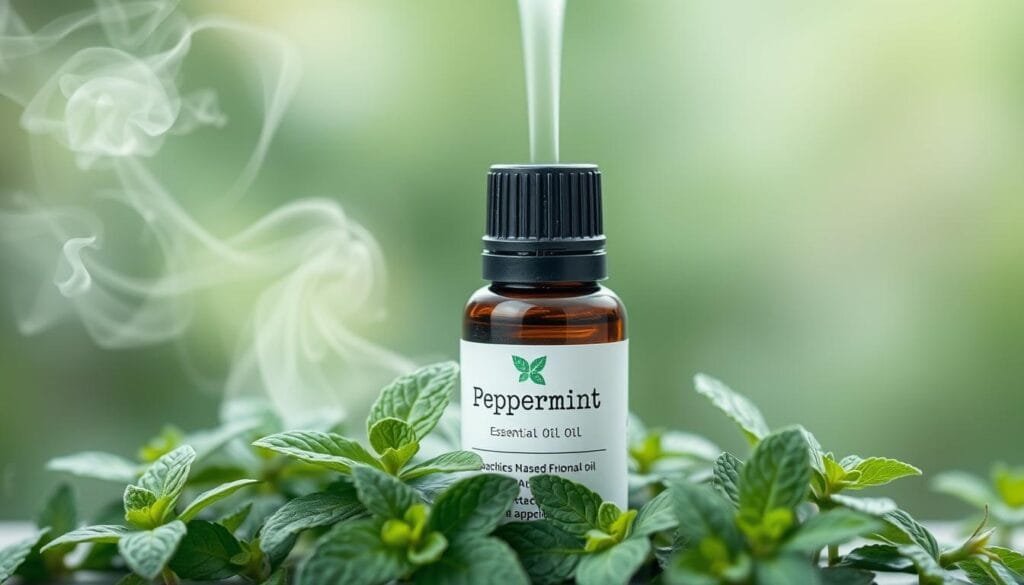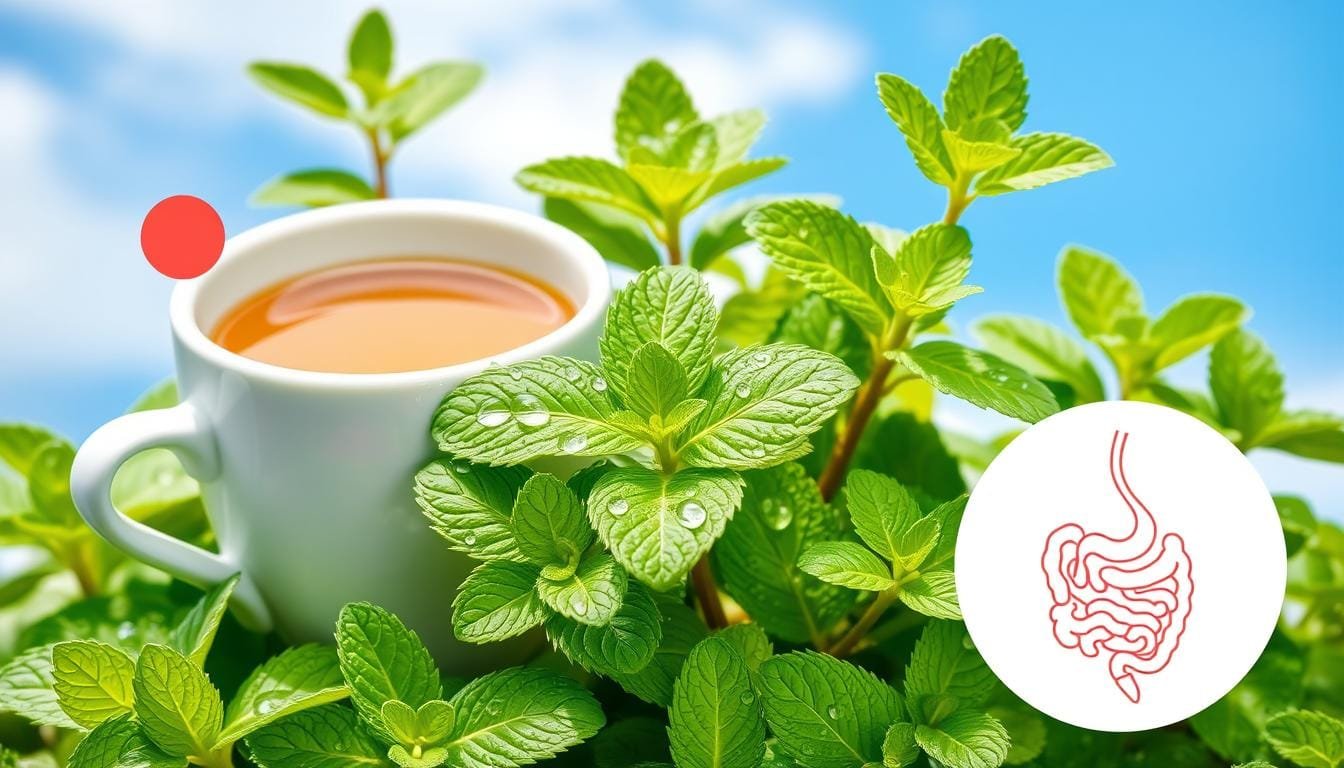I’ve always been fascinated by natural remedies, and peppermint is one that stands out. It’s a mix of watermint and spearmint, used for centuries in traditional medicine. Its unique smell and compounds like menthol make it a treasure trove of health benefits.
Peppermint can ease digestive problems and even help with headaches. It’s great in tea, capsules, or as an essential oil. This herb is essential for anyone looking to boost their health naturally. Let’s dive into the top 10 benefits of peppermint and how to use it every day.
Understanding Peppermint: A Historical and Scientific Overview
Peppermint has a long and interesting history. It dates back to ancient times. This herb has been used for both health and cooking for many years. It’s mentioned in Greek myths, Roman texts, the Bible, and during the Middle Ages.
It wasn’t until the late 1600s that peppermint was seen as its own type. Yet, its health benefits have been known for thousands of years.
Ancient Uses and Traditional Medicine
The peppermint plant is known for its strong menthol smell and cool feeling. It has been valued for its health benefits for a long time. Ancient Greeks, Romans, and Egyptians used it to treat many health problems.
They used it for issues like indigestion and breathing problems. The herb’s versatility and long use have made it a favorite natural remedy.
Chemical Composition and Active Compounds
Peppermint’s strong effects come from its special chemical makeup. Menthol is a key compound that gives peppermint its cool feeling and minty smell. It’s found in high amounts in peppermint’s essential oils.
Peppermint also has other helpful compounds like flavonoids and phenolic acids. These add to its health benefits.
Different Forms of Peppermint
- Peppermint tea: A classic and popular way to enjoy the soothing and digestive benefits of peppermint.
- Peppermint capsules or supplements: Concentrated forms of peppermint, often used for targeted health concerns.
- Peppermint essential oil: Highly potent and versatile, peppermint oil can be used in various ways, from aromatherapy to topical applications.
- Peppermint extracts and tinctures: Liquid formulations that concentrate the active compounds of the peppermint plant.
Peppermint is a beloved and widely-used herbal supplement. It has a rich history and scientific evidence supports its health benefits.
“Peppermint has been used for centuries in cooking, specially in sweets and desserts.”
Benefits of Peppermint for Digestive Health
Peppermint is a versatile herb that helps with digestive health. It relaxes the tissues in the stomach, easing many digestive problems. Studies show peppermint can soothe stomach pain and help with irritable bowel syndrome (IBS) and other issues.
Relief from IBS Symptoms
Irritable bowel syndrome (IBS) can cause a lot of discomfort. It includes stomach pain, bloating, constipation, and diarrhea. Luckily, research shows peppermint oil can help a lot. In one study, 75% of IBS patients felt much better after 4 weeks of using peppermint.
Managing Nausea and Bloating
Peppermint’s benefits go beyond IBS. It helps with nausea and vomiting, even in those undergoing chemotherapy. It also eases gas, bloating, and indigestion by calming the digestive system.
Supporting Healthy Digestion
Peppermint does more than just treat specific problems. It also boosts overall digestive health. A study in Taiwan found that patients taking peppermint oil experienced less stomach pain, bloating, and gas. Almost 80% of them felt better overall.

The research is clear: peppermint is a natural solution for many digestive issues. It helps with IBS symptoms, nausea, bloating, and supports gut health. Adding peppermint to your routine can bring you the digestive relief you need.
Natural Headache and Migraine Relief
Looking for a natural way to ease tension headaches or migraines? Peppermint oil might be the solution. Its menthol increases blood flow and offers a cooling effect. This can help reduce headache pain.
Studies show applying peppermint oil to the forehead and temples can lessen migraine pain. It’s as effective as lidocaine for headache relief. Its muscle-relaxing properties also help with tension headaches.
Peppermint oil’s benefits extend beyond headache relief. It can also ease nausea, stress, congestion, and muscle pain. A study found that a gel with 6% menthol from peppermint oil reduced pain in just 2 hours.
But, use peppermint oil with caution. Large doses can be toxic if swallowed and may cause heartburn. It can also interact with some medications. Always talk to your healthcare provider before using it for headaches.
“Peppermint oil is often used for migraine and other types of headaches.”
Peppermint oil is a natural option for migraine treatment and tension headaches. Use it safely and responsibly. With some trial and error, you might find it’s the natural pain relief you’ve been looking for.
Respiratory System Support and Sinus Relief
Peppermint is great for your respiratory health and sinus relief. The menthol in peppermint makes breathing feel easier. It can help with improving airflow in your nose.
Drinking warm peppermint tea can help with sinus congestion. It can ease a runny nose, cough, and sore throat.
Fighting Common Cold Symptoms
Peppermint has antibacterial, antiviral, and anti-inflammatory properties. These can help fight the common cold. Its decongestant qualities can break down phlegm and clear nasal passages.
Adding peppermint to your daily routine can help aid breathing. It supports your respiratory system during winter.
Clearing Nasal Passages
The menthol in peppermint acts as a nasal decongestant. It reduces inflammation and clears congestion. It’s useful for sinus issues caused by infections, allergies, or the common cold.
Peppermint improves airflow and loosens mucus. It offers natural relief for sinus congestion.

“Researchers found that 1,8 cineole, the main component of eucalyptus oil, is an effective and safe remedy for sinusitis without antibiotics.”
While peppermint can offer temporary relief, see a healthcare professional for persistent or severe sinus issues. They can help address underlying causes and ensure long-term sinus health.
Mental Focus and Energy Enhancement
Peppermint can be a strong natural stimulant. It helps boost cognitive performance, alertness, and mental clarity. Studies show that inhaling peppermint essential oil can make you feel more alert and focused.
A 2008 study with 144 participants found that peppermint aroma improved cognitive performance and alertness. It also enhanced memory and feelings of alertness compared to other groups. Another study showed that drivers smelling peppermint were more alert and less frustrated and tired.
The cognitive and mood benefits of peppermint come from its active compounds, like menthol. Its scent may wake up the brain’s memory and learning center. Peppermint essential oil has even helped mice with learning and memory problems.
| Essential Oil | Claimed Benefits |
|---|---|
| Peppermint | Energizing, Boosting spirits, Improving energy levels, Uplifting mood |
| Rosemary | Improving focus and memory, Enhancing cognitive performance |
| Lemon | Enhancing positive mood |
| Sweet Orange | Improving athletic performance |
| Spearmint | Improving athletic performance, Enhancing learning and memory |
Peppermint and other essential oils may have great benefits for our minds and mood. But, we need more research to know for sure. Yet, the current studies suggest that peppermint could be a simple way to boost mental clarity and energy levels.
“The aroma of peppermint essential oil improved cognitive performance and increased alertness in study participants, enhanced memory, and reported feelings of alertness.”
Natural Solution for Fresh Breath and Oral Health
Good oral hygiene is key for a healthy smile. Nature gives us peppermint, a powerful herb for oral health. Its antibacterial properties fight bad breath and boost dental health.
Antibacterial Properties
Peppermint oil has menthol, which makes it cool and refreshing. This menthol helps fight oral pathogens like tooth decay and bad breath. Studies show peppermint mouthwashes can cut down on bacteria, making your breath fresher.
Dental Health Benefits
Peppermint also has anti-inflammatory properties. It soothes gum irritation, great for gingivitis. It boosts saliva production, helping your mouth’s natural defense.
Peppermint is in many oral care products like toothpaste and mouthwash. These products offer a refreshing experience and help your teeth and gums.
Adding peppermint to your oral care routine is natural and effective. It fights plaque, tartar, and gum irritation. Peppermint is a great ally for your oral health.
Supporting Women’s Health and Menstrual Comfort
Peppermint can be a big help for women’s health, mainly with menstrual cramps. Research shows it works as well as over-the-counter period pain relief meds. It can lessen the pain and how long it lasts.
Peppermint relaxes muscles. The menthol in it can make period pain less intense and shorter. This makes peppermint a gentle way to help women’s health during their period.
“I’ve noticed a significant difference in my menstrual cramps after using peppermint essential oil. It’s a game-changer for my monthly discomfort.”
Peppermint tea is also a good option. It has menthol, flavonoids, and rosmarinic acid. These help relax the uterus and ease pain.
Peppermint isn’t a magic fix, but it’s a natural way to help with period pain. Always talk to a doctor to find what works best for you.

Antimicrobial Properties and Immune Support
Peppermint oil is known for its strong antimicrobial abilities. It can kill and stop the growth of harmful bacteria like E. coli, Listeria, and Salmonella. It also fights Staphylococcus and bacteria that cause pneumonia.
Peppermint oil’s effects aren’t just limited to foodborne pathogens. It targets bacteria in the mouth too. This makes peppermint a natural ally for good oral health.
Peppermint oil’s ability to fight microbes suggests it can boost the immune system. By stopping harmful bacteria, it helps the immune system work better. This leads to better overall health.
| Antimicrobial Activity of Peppermint Oil | Findings |
|---|---|
| Antibacterial against foodborne pathogens | Effective in killing and preventing the growth of E. coli, Listeria, and Salmonella |
| Antibacterial against Staphylococcus and pneumonia-linked bacteria | Demonstrated potent antibacterial properties against these common bacterial strains |
| Antibacterial activity against oral bacteria | Targeted various types of bacteria commonly found in the mouth |
| Potential for immune system support | Antimicrobial effects suggest peppermint oil may boost the immune system and fight infections |
Using peppermint oil’s natural antibacterial and antiviral powers can help support the immune system. It’s a natural way to promote overall health and well-being.

Weight Management and Appetite Control
Peppermint tea is a great choice for those trying to lose weight or control their appetite. It’s calorie-free and has a sweet flavor. This can help you feel full without adding extra calories.
The aroma of peppermint tea can also help reduce hunger. Its refreshing taste is better than sugary drinks or snacks. Drinking peppermint tea daily can help you stay on track with a healthy diet.
While peppermint tea is helpful, it’s not a magic solution. It should be part of a healthy diet and regular exercise. Always talk to your doctor before adding it to your routine.







